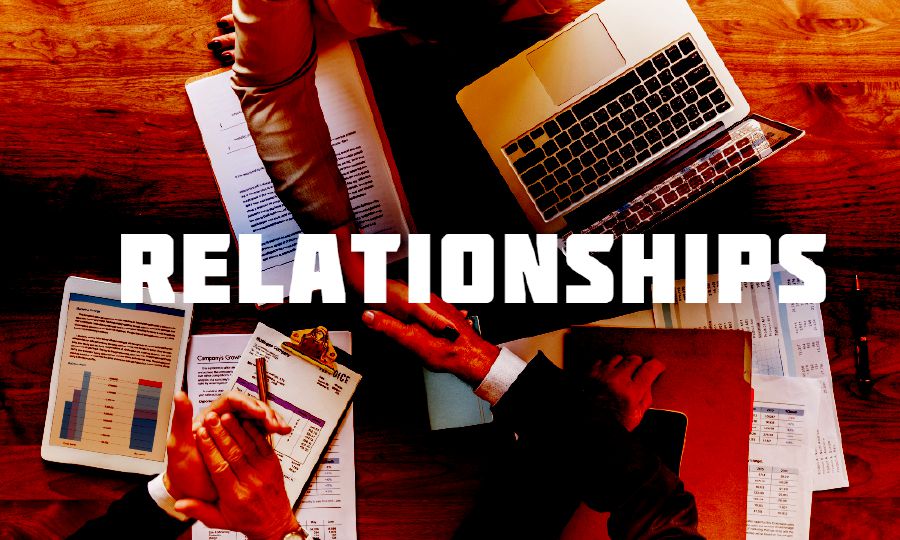It is true that everything I have ever achieved in life, as well as my career, has been because of my ability to forge real relationships with the people I meet and work with.
These connections have come through work or my business contacts. And at other times, these relationships develop quite serendipitously.
We all need the goodwill of others to progress in life. And this will only happen if you're able to actively cultivate good relationships with them.
Many people do not see the real value of building good relationships.
A study by the University of Sydney in 2001 that examined some of the top-performing workplaces in Australia to analyse the reasons for their success, identified that the quality of workplace relationships determined if an organisation was going to produce great results.
This means that people connecting to each other as friends, colleagues and co-workers played a major role in making a business successful. Companies that have people supporting and helping each other to get the job done are the most effective ones.
To put it simply, you are happy to wake up and go to work with a spring in your step, when you like the people you work with.
On the other hand, if you work in an organisation with colleagues who are insufferable and who are unwilling to support or help you, it really impedes your ability to deliver results.
Many people spend more waking hours with work colleagues than with their spouses and families. This makes relationship building a real high value task at workplaces.
In my experience with training and coaching, team cohesiveness happens only when you forge decent and solid relationships based on mutual respect and understanding.
Some 20 years ago, when I started my training and consulting firm, EQTD Consulting, I focused on conducting team building or team dynamics sessions for corporate companies.
I am sure you have been to these programmes.
Your company puts together a session where all employees are required to go to a resort, usually in a remote location.
There, you and your colleagues will spend the few days engaging in various team-building activities.
Your bosses will often come along, if not for the entire session, but at least for a few hours. This applies a tremendous amount of pressure on you to behave well and to show a palpable keenness to participate.
Most of you will accept the programme as something that just needs to be done; that there is no point resisting the sometimes silly things you are asked to do. So you play along.
Usually, at the end of the session, you would be asked to declare your newfound commitment to your teammates and pledge to work together for a common vision.
And since the bosses are there to take notes, and everyone else is doing so, you will resign yourself to making these declarations, too.
In reality, a few days after you get back to the office, and when perhaps the fleeting excitement of the fun parts of the training subsides, you will realise that nothing much has changed. The people you dislike continue to irritate you.
I know this because I started my life as a management trainer by running these of programmes.
Over time, I understood that these sessions are really very shallow. The feel-good factor has a limited shelf life. The commitments that participants make are mostly unachievable, and the motivational element never lasts in people, if they are not driven by some meaningful purpose.
No team-building session can create sustainable good vibes in an organisation if co-workers do not establish meaningful relationships. And, meaningful relationships cannot be forged in an artificial or forced environment.
After some time dabbling with these team-building programmes, I decided that I had to change mine to focus on helping companies create conducive environments where workplace relationships could thrive.
This begins when each person is clear about their personal purpose-drive.
Once this is done, I help individuals align their purpose with the organisation's goals. And when this is established, appropriate communication strategies need to be deployed to help people build strong bonds with each other.
Team connectivity depends on mature and professional relationships.
And, you will function more smoothly together when there is a personal element to your relationship with others in your office. The most successful leaders exemplify how to do this effectively. They take the trouble to be genuinely interested in the lives of their colleagues, without being obtrusive.
Meanwhile, you also tend to not contribute ideas in groups that you are unfamiliar with unless you are an extroverted person.
The situation in Malaysia often gets exacerbated because of our general "over-politeness". Good ideas are lost simply because you don't communicate with people you are unacquainted with.
Common goals that are clearly communicated, positive after-work experiences and problem-solving successes will contribute to the consolidation of workplace relationships.
Focus on developing good relationships based on mutual respect with your colleagues as this will help you build relationships.
If you want the results you are aiming for, start with building quality relationships with the people around you.
The views expressed in this article are the author's own and do not necessarily reflect those of the New Straits Times






